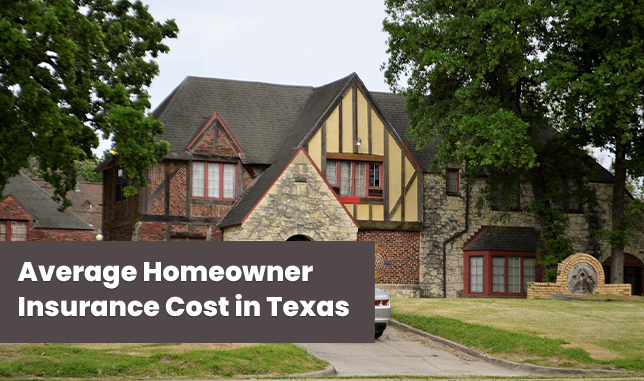Average Homeowner Insurance Cost in Texas
As a homeowner in Texas, protecting your investment is of paramount importance. Homeowner insurance provides financial security and peace of mind, safeguarding your home from unexpected events. However, the cost of homeowner insurance can vary significantly depending on various factors. In this article, I will explore the average homeowner insurance cost in Texas and the factors that influence it.
Read more article: Homeowners Insurance for a Mobile Home
Understanding Homeowner Insurance
What is Homeowner Insurance?
Homeowner insurance, also known as home insurance, is a type of property insurance that provides financial protection to homeowners in the event of unexpected damages or losses to their property. It typically covers the structure of the house, personal belongings, and liability for accidents that occur on the property. Having homeowner insurance is essential to safeguarding your investment and ensuring peace of mind.
Factors Affecting Homeowner Insurance Cost
Several factors contribute to the calculation of homeowner insurance premiums. These include:
1. Location
The geographic location of your home plays a significant role in determining the insurance cost. Certain areas in Texas might be prone to natural disasters like hurricanes, tornadoes, or flooding, which could result in higher insurance rates.
2. Construction Materials
The type of materials used to build your home can impact insurance costs. Homes made of fire-resistant and durable materials might attract lower premiums.
3. Home Value and Replacement Cost
The value of your home and the cost to rebuild it from scratch are crucial factors in calculating insurance premiums.
4. Security Features
Homes equipped with security systems, fire alarms, and other safety measures may qualify for discounts on insurance premiums.
5. Claims History
Your past insurance claims history can influence the rates you'll be offered. A history of frequent claims might lead to higher premiums.
6. Credit Score
In some cases, your credit score can be a factor in determining your insurance rates. A higher credit score may lead to lower premiums.
Average Homeowner Insurance Cost in Texas
Now, let's delve into the average homeowner insurance cost in different regions of Texas:
North Texas
In the North Texas region, which includes cities like Dallas, Fort Worth, and Denton, the average annual homeowner insurance cost ranges from $1,500 to $2,000. This area is relatively less prone to natural disasters, resulting in lower premiums.
Central Texas
Cities like Austin, San Antonio, and Waco fall under the Central Texas region. Here, the average annual homeowner insurance cost is approximately $1,800 to $2,300. While the premiums are slightly higher than North Texas, they still remain reasonable.
East Texas
East Texas, with cities like Houston and Beaumont, experiences a higher risk of hurricanes and flooding. As a result, the average annual homeowner insurance cost in this region ranges from $2,000 to $2,500.
West Texas
West Texas, including Lubbock and El Paso, enjoys a lower risk of natural disasters. Therefore, the average annual homeowner insurance cost in this region is relatively lower, ranging from $1,300 to $1,800.
Coastal Areas
Coastal areas such as Corpus Christi and Galveston face a substantial risk of hurricanes and flooding. Consequently, the average annual homeowner insurance cost in these regions can be higher, ranging from $2,500 to $3,500.
Please note that these are approximate figures based on general trends, and individual insurance costs may vary depending on the specific circumstances of your home and coverage needs.
Tips for Lowering Homeowner Insurance Costs
1. Shop Around
Don't settle for the first insurance quote you receive. Take the time to compare rates from different insurance providers to find the best deal that meets your needs.
2. Increase Deductibles
Consider opting for a higher deductible, which is the amount you'll pay out of pocket before your insurance coverage kicks in. Increasing your deductible can lead to lower premium costs.
3. Bundle Policies
If you have multiple insurance needs, such as auto or life insurance, consider bundling them with your homeowner insurance. Insurance companies often offer discounts for bundling policies.
4. Improve Home Security
Investing in security features like burglar alarms, security cameras, and reinforced doors can make your home safer and might qualify you for lower insurance rates.
5. Maintain a Good Credit Score
Aim to maintain a good credit score, as many insurers consider this when calculating premiums. Pay bills on time and reduce outstanding debts to improve your creditworthiness.
6. Avoid Making Small Claims
Instead of filing claims for minor damages, consider paying for them out of pocket. Frequent claims can lead to higher premiums over time.
Conclusion
In conclusion, understanding the average homeowner insurance cost in Texas is vital for every homeowner in the state. The factors that influence insurance premiums, such as location, home value, security features, and claims history, play a significant role in determining the cost. While certain regions in Texas might experience higher risks of natural disasters, others enjoy a more favorable insurance environment. It is crucial for homeowners to shop around, compare quotes, and consider various strategies like increasing deductibles, bundling policies, and improving home security to lower insurance costs. By taking these measures, Texans can ensure their homes are protected adequately without breaking the bank.
Moreover, this comprehensive guide has equipped readers with valuable insights to make informed decisions when it comes to homeowner insurance. Remember, finding the right balance between coverage and cost is essential, and each homeowner's situation may differ. Whether you reside in North Texas with its relatively lower premiums or in the coastal areas with higher insurance costs, being proactive and implementing the tips provided can lead to substantial savings. Ultimately, homeowners in Texas should prioritize securing their properties and loved ones with the right insurance coverage, providing peace of mind in the face of any unforeseen circumstances that may arise in the future.
Read more article: State Farm Home and Auto Insurance

